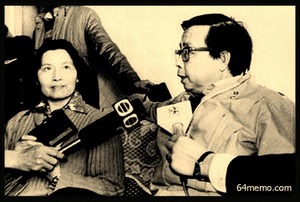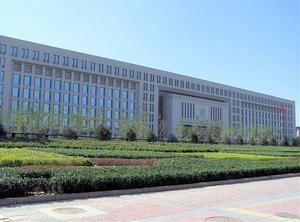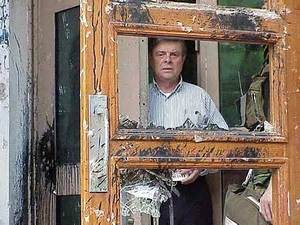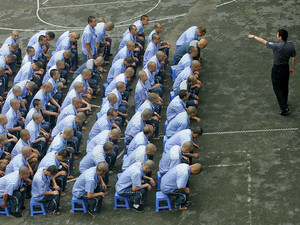Note: Our accounts contain the personal recollections and opinions of the individual interviewed. The views expressed should not be considered official statements of the U.S. government or the Association for Diplomatic Studies and Training. ADST conducts oral history interviews with retired U.S. diplomats, and uses their accounts to form narratives around specific events or concepts, in order to further the study of American diplomatic history and provide the historical perspective of those directly involved.
The extent of the surveillance operations of the Soviet KGB is legendary, but the Soviet Union was not the only country to maintain an intelligence service. China established its own version, known as the Ministry of State Security (MSS), to provide for national security, gather foreign intelligence, and coordinate surveillance activities to identify subversive activities against the government. Although the MSS generally keeps a low profile, U.S. diplomats have inevitably come into contact with Chinese security over the years, creating memorable stories along the way. They show not only how effective Chinese security forces can be, they also reveal that even though the MSS prefers to operate covertly, it is not afraid to make its presence known if it wants to make a point.  The account was compiled from interviews by ADST with Kenneth Yates (beginning in 2011), Charles G. Harter (2004), and Robert Goldberg (2011). Read the entire account on ADST.org
The account was compiled from interviews by ADST with Kenneth Yates (beginning in 2011), Charles G. Harter (2004), and Robert Goldberg (2011). Read the entire account on ADST.org
YATES: In the back of our compound at USIS [U.S. Information Service], we had the residence of the Ambassador and the embassy's Health Unit. That compound once served as the entire liaison office and so had several support buildings that were used to support the much smaller staff of the time.
It was in the health unit that Dr. Fang Lizhi, the very famous astrophysicist dissident was in "hiding." Of course, the Chinese knew exactly where he was and likely had the place zeroed in with all types of detection devices.
Every day I had to go to work in my office not more than 20 yards from where Dr. Fang and his wife resided. He had come to the residence during the period of Tiananmen, and since diplomat compounds are legally the territory of the resident embassy, the Chinese were not allowed to enter.
So we had super special Chinese surveillance around the compound. Across from the sole gate to the compound sat a Mercedes Benz with four security personnel at all times. They consisted of a driver, one female security agent, one apparent supervisor, a male, and one who was obviously a simple muscle man. We also had a Chinese security motorcyclist who always hung out with them. They would play cards in the car with all the doors open. They were bored stiff. I actually felt sorry for them.
I would often drive my car into the compound on weekends to wash it with the hose on the shady side of the building. Of course, it was close to the building and not within easy sight of the security people monitoring the building.
On leaving the compound, I would be followed every time by both the Mercedes and the motorcycle because they were suspicious that I might be spiriting away Dr. Fang, his wife, or both. Of course, another Mercedes would take the place of the one following me from the compound. I was followed no matter where I went, shopping, picking my wife up for lunch at a hotel somewhere, etc. When we would get out of the car, lock it, and walk away, one of the security people would approach it to check out the back seat for anything suspicious. Often, one would stand on the rear bumper and jump up and down to see whether or not something heavy was in the trunk. They were always careful not to damage anything and never tried to break in, but they sure made a mess of my rear bumper.
I was followed no matter where I went, shopping, picking my wife up for lunch at a hotel somewhere, etc. When we would get out of the car, lock it, and walk away, one of the security people would approach it to check out the back seat for anything suspicious. Often, one would stand on the rear bumper and jump up and down to see whether or not something heavy was in the trunk. They were always careful not to damage anything and never tried to break in, but they sure made a mess of my rear bumper.
Sometimes, I was very happy to have them escorting me, because in Beijing traffic, you are always subject to getting into an accident from a bicyclist who rides right in front of you without any chance for me to stop. If you hit the person, possibly causing injury, maiming or death, the consequences can be very difficult.Crowds gather quickly at any accident, and the foreigner is always considered guilty. The courts always seem to find that guilt goes with the ability to pay. People at the embassy had those kinds of incidents too frequently during the time I was in Beijing. If you do, you have real trouble that may lead to your being forced to leave the country or even physical injury from the crowds that can easily be stirred up.Anyway, having the security car right on my tail meant I probably would have had plenty of witnesses if I had gotten into any kind of problem. Because the security car carried no license tags, it was easily spotted for what it was by the normal Beijing citizen. No one would want to tangle with the security division, so that alone might have dissuaded those curious that would otherwise run to check out an accident. In a way, the following chase car was a strange comfort.
I never had any problems with chase cars. Knowing I would not cause them trouble, they would not tailgate, and although they had to follow me, they were always polite and never abused their authority. I never had any difficulties.
Some others who got their kicks from losing the chase cars did have trouble. We had one younger officer who had a pickup truck, one with a camper body on the back. It was easily identified. He had good Chinese and traveled all over Beijing. He knew some of the dissidents. Like the rest of us, he was routinely followed by the security forces.
Unfortunately, he saw it as a game. He would cut down some hutong, which is an alley in Beijing, and make a quick turn down another one. He knew his way around Beijing and sometimes could lose the security car. He did so on several occasions which he thought was a terrific experience and some kind of minor victory. Yet it was a pyrrhic one, for he found one morning that all four tires were slashed flat. The Chinese security forces came over and looked and said, "Gee, this is terrible. Must be one of these foreign kids, a Chinese kid wouldn't do that." That probably was true, a Chinese kid didn't do it.I think it was a pretty obvious warning that if you are going to fool with the security forces, you are not going to be driving. So take your choice, either no tires or the security people. So I think he learned his lesson at that point. This was their country and if they wanted to do something, they would. You buck them at your own peril.
Yet it was a pyrrhic one, for he found one morning that all four tires were slashed flat. The Chinese security forces came over and looked and said, "Gee, this is terrible. Must be one of these foreign kids, a Chinese kid wouldn't do that." That probably was true, a Chinese kid didn't do it.I think it was a pretty obvious warning that if you are going to fool with the security forces, you are not going to be driving. So take your choice, either no tires or the security people. So I think he learned his lesson at that point. This was their country and if they wanted to do something, they would. You buck them at your own peril.
"Q: One of the events that came up during the time you were in Beijing was the May 1999 bombing of the Chinese embassy in Belgrade.
GOLDBERG: There was disbelief in the Mission that this had happened. You know the famous story -- we hit what we wanted to hit but it wasn't what we thought it was. The mission hunkered down.
The first day, demonstrations around the embassy were reasonably peaceful. We closed up shop and were told to stay at home. You could always get into the embassy by jumping over the wall between the Irish and American embassies and you could exit the same way. We had very good relations with the Irish.
But the demonstrations turned violent the evening of the second day after CCTV [Chinese TV] coverage of the bodies of the dead Chinese diplomats being flown home and images of bloody clothing. That evening, the Chinese government bussed in some hooligans likely from the Public Security Bureau or the Ministry of State Security, and they threw rocks and plastic liter bottles filled with urine at the mission.
They busted almost every window in the mission, but they never broke one of our antiquated Wangs [an early word processing computer]. It didn't make any sense. Such extraordinary aim.
While the demonstrations were going on, we were supposed to stay inside our apartments near the Embassy, but in fact, they were in such a limited area - with Chinese students who were bussed in to march around for a couple of hours or so - that we didn't feel any inhibition about sneaking out the front of side entrance and going over to Starbucks for a cup of coffee. Some officers met contacts there who provided insights about what was happening elsewhere in the city.
HARTER: One issue in which I was directly involved was the back-and-forth negotiation to get an American citizen scholar freed from detention in China.
This young woman had been doing research in China and got involved with a Chinese man at her school. According to the Chinese charges, he ended up bringing her "classified" documents which were found in her possession when her apartment was searched. She, of course, considered them as academic research materials even though they had Chinese classification markings on them indicating they were for "internal" (meaning government) use.
After she was arrested, we had some difficulty getting initial access to her. Thereafter, we had to arrange some way to get her released, and hopefully also her Chinese colleague, who over the period before their arrest had become her planned fiancé. In fact, if I recall correctly, they had asked permission to marry in China and that was what likely triggered the government's attention to them. From the [State Department's China] desk, we directed the Embassy's interventions with the Chinese and over several weeks of dialogue managed to get her released. When she returned to the U.S., I interviewed her over a couple of days.The two of us had a long discussion about her particular situation and how she was able to work and study in China. We also talked about how she and her fiancé had managed to study together and then reviewed the trial and prison period and how she had been treated.
From the [State Department's China] desk, we directed the Embassy's interventions with the Chinese and over several weeks of dialogue managed to get her released. When she returned to the U.S., I interviewed her over a couple of days.The two of us had a long discussion about her particular situation and how she was able to work and study in China. We also talked about how she and her fiancé had managed to study together and then reviewed the trial and prison period and how she had been treated.
It was a fascinating opportunity to see how the Chinese security system worked. Afterward I recall writing about how her case pointed to future problems we were likely to have as more and more U.S. students went to China for study and research.
As I recall, she seemed to me to be rather naive about how things operated in China, but there was no denying she had gone through a very traumatic experience and I really empathized with her. I had no doubt she was quite serious about her emotional commitment to her fiancé. Because she was anxious about her fiancé, we also spent some considerable effort trying to convince the Chinese to release him as well.
While she had been released and expelled from China after being convicted of having improperly accessed Chinese documents, he had been sentenced and was serving a prison term which had several years to run. Senior U.S. officials made appeals to the Chinese for his release and his detention was a topic every time the Secretary of State went to China. He served a couple of years doing prison labor and then as a humanitarian gesture the Chinese government permitted him to leave the country. After he arrived in the U.S., the two did marry, but I have no idea what has happened to them since.
